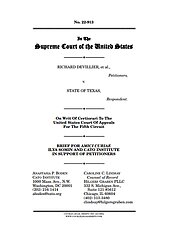Learn more about Cato’s Amicus Briefs Program.
In Knick v. Township of Scott, the Supreme Court affirmed that when the government takes property without just compensation, the property owners should have their day in federal Court. But where there’s a will to evade federal courts, government defendants will find a way. Thus, just four years later, the Court is once again hearing a dispute about the right of property owners to go to federal court to assert Fifth Amendment takings claims. Cato’s Center for Constitutional Studies has filed a brief in support of the property owners.
In Knick, the Court recognized that state and local governments had created a Catch-22 for plaintiffs asserting takings claims: plaintiffs could not go to federal court without first going to state court, but if they went to state court and lost, the government would argue their claims were barred in federal court. The Court invalidated this scheme and affirmed that property owners could go to federal court without exhausting any state remedies.
Just four years later, the Fifth Circuit has blessed a scheme that might even be worse than the one that preceded Knick. At least in that case, property owners could get a ruling in state court. In Devillier, the plaintiffs brought a claim in state court, but Texas removed the case to federal court. Once the case was in federal court, Texas argued (and the Fifth Circuit agreed) that there’s no federal cause of action against states under the Fifth Amendment. Thus, under the Fifth Circuit’s ruling, plaintiffs can’t even get a remedy in state courts.
That’s wrong as a matter of text, history, and Supreme Court precedent. The Fifth Amendment creates a direct cause of action against state governments under the Fifth Amendment just as it does with other provisions of the Bill of Rights. Nothing in the text of the Constitution suggests otherwise.
Moreover, the Supreme Court has long recognized the self-executing character of the Takings Clause. Knick emphasized that “it has been established at least since Jacobs v. United States … (1933), that claims for just compensation are grounded in the Constitution itself.” Plaintiffs therefore need not rely on any statute to bring a claim against a state or local government for an uncompensated taking. Instead, they can rely on the Constitution alone. The history of the Fourteenth Amendment (which incorporated the Takings Clause against the states) likewise supports that plaintiffs have a direct cause of action against state governments for takings claims.
In a single-paragraph decision, the Fifth Circuit failed to address a long line of Supreme Court precedent, including Knick, or any of these arguments. In our brief, we argue that text, history, and precedent require reversal. If the Fifth Circuit’s decision is left to stand, it will effectively nullify a fundamental constitutional right for millions of Americans.

This work is licensed under a Creative Commons Attribution-NonCommercial-ShareAlike 4.0 International License.


